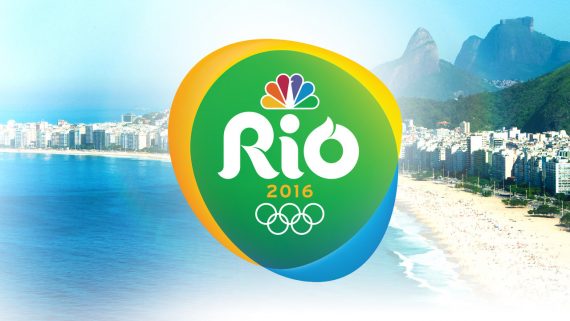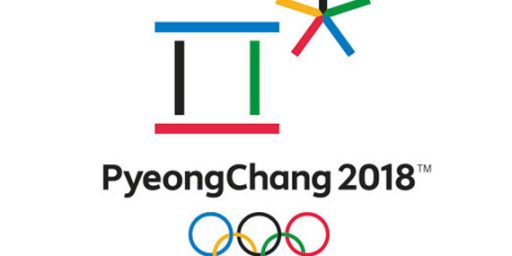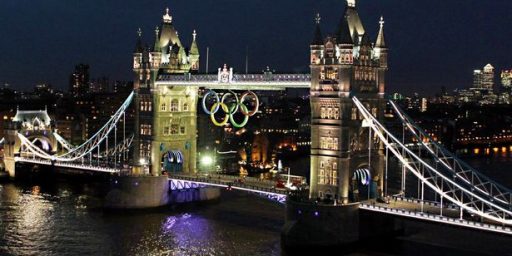Summer Olympics Were Lowest Rated Since 2000
Despite being much more conveniently located for viewers in the United States, viewership for the just-concluded Olympics were the lowest they've been in sixteen years.
Notwithstanding the fact that their location in Rio de Janeiro made them well-positioned for the U.S. market, the recently concluded 2016 Summer Olympics were the lowest rated in 16 years, and that trend is only likely to continue:
NBC is touting its coverage of the 2016 Summer Olympics as the “most successful media event in history.” And to be sure, the massive effort the company put into live streaming and digital efforts from Rio de Janeiro paid off pretty well.
But in terms of TV ratings? Not so much. The games end as the lowest-rated and least-watched Summer Olympics since 2000.
Whatever metric NBC is using to uphold its “most successful” claim isn’t clear. Streaming of the Rio Games was indeed way up vs. 2012 in London: 100 million unique users (a 29 percent bump from 2012) streamed 3.3 billion minutes of the games; 2.7 billion of those minutes were devoted to live streams, the rest to replays and highlights. The live streaming was more than the combined live-streamed minutes of all prior Olympics (1.48 billion).
Of course, there was a lot more to see this time around: NBC live-streamed 4,500 hours of competition compared to 3,500 hours four years ago. Still, that’s an impressive feat, and the one thing most Olympics observers seem to agree NBC did well this time around was its digital product.
But the on-air Olympics, even with simultaneous cable and live-streaming added to NBC’s prime-time total, are down. In both viewers and household ratings (which are useful for historical comparisons), Rio 2016 represents the lowest-rated Summer Olympics since 2000 in Sydney and the second-lowest since NBC took over the summer games in 1988.
London was NBC’s highest-rated Summer Olympics staged outside the United States. This year’s games were down 21 percent in viewers and 15 percent in households vs. 2012 for all nights. (NBC has been touting the numbers for the 15 nights of competition as closer to London’s average, but those exclude the opening and closing ceremonies, which took big hits vs. four years ago.)
These ratings are important to NBC, of course, because they will in part determine what it is able to charge for advertising time during the upcoming Olympics that it has purchased the broadcast rights for, which to this point cover both the Summer and Winter games through 2032. Already, the company is recognizing the fact that a combination of massive changes in the way Americans in particular consume media and the location of the next three Olympic Games will likely mean that ratings are unlikely to improve over this year and that it will need to figure out how to change the way it presents the games while still making money off the deal:
NBCUniversal heads into the next three Olympics — all of them in Asia — faced with a critical question: Was the lower-than-expected prime-time viewership for the just-completed Summer Games in Rio de Janeiro a fluke or a harbinger of fraying audiences over the next six years?
The answer, for now, is unknown, as NBC prepares for the 2018 Winter Games in Pyeongchang, South Korea, the 2020 Summer Games in Tokyo and the 2022 Winter Games in Beijing (which hosted the Summer Olympics eight years ago). No one is certain how much further consumers will alter their media habits, how much further television viewing will be diminished, or what new technologies will emerge during that time.
A further challenge to carrying an Olympics in Asia: the 13- to 14-hour time differences between the host cities and New York.
“You’d be a lot less concerned if you were in the United States or in Continental Europe,” said Rich Greenfield, an analyst at BTIG Research. “Ninety percent of the content from Asia will be happening when we’re asleep — and when we wake up we’ll see our Twitter feeds and news stories telling us what has already happened.”
NBC works with the international federations that govern Olympic sports and the International Olympic Committee to get the most favorable scheduling. For games in Asian locations, NBC’s goal is to have as many marquee sports as possible — swimming, diving, track and field and gymnastics in the summer; figure skating and skiing in the winter — taking place at times when they will be live in prime time on the East Coast. NBC would not necessarily need to cover gymnastics live; in Brazil, it showed the events on a delay of several hours.
Still, scheduling audience-grabbing events in prime time can be a tight squeeze. Events that start at noon in Korea in 2018 would be seen at 10 p.m. the prior day in the Eastern time zone. And NBC cannot get everything it desires in scheduling despite the enormous rights fees it pays; other countries’ networks, including those in Europe, for example, push for favorable scheduling of their own to televise their popular sports.
Neal Pilson, an industry consultant and former head of CBS Sports, said: “If you asked NBC’s preference, they’d probably prefer not to have three straight in Asia, but they bought into the process without knowing where they would be held. But I think NBC will figure out a way to prevail in terms of scheduling.”
Still, even a favorable time zone like Brazil’s did not deliver for NBC as the network had expected. NBC thought that the greater number of live prime-time broadcasts from Rio would produce audiences larger than those amassed for London four years ago. But at 25.4 million, NBC’s broadcast audience fell 18 percent from the 31 million that watched the London Games. It added 2.1 million more viewers from live streaming and Olympic events on the NBCSN and Bravo cable networks. In all, the three sources of viewership did not combine to match London’s broadcast-only performance.
Time zones and scheduling seem to be only part of the issue that NBC is likely to face in the future, though. The Rio Olympics were the first Summer Olympics held in a venue close to the United States since the 1996 games in Atlanta, and the first Olympics of either the summer or winter variety to be held in the Western Hemisphere since the 2010 Winter Olympics in Vancouver, Canada. With it’s location just one hour ahead of the Eastern United States, and some other locations in Brazil that were used as Olympic venues located in the same time zone, one would have thought that the scheduling of events most likely to draw the most viewers would have been easier and that ratings would reflect this. Instead, it would appear that NBC had fallen victim to the same changes sweeping the way Americans consume media that are impacting other areas of the business:
“Television is in a secular decline,” Mr. Greenfield said, adding that viewers increasingly accustomed to binge-watching online series are likely to grow increasingly dissatisfied with NBC’s prime-time model that compels viewers to wait for their favorite sport to be shown.
This isn’t to say that NBC didn’t do well during the two weeks that the covered the Olympics on their main channel as well as its sports network and numerous affiliated cable networks, including MSNBC. Even though viewership was down from what it was for the London games four years earlier, they still won the night each night the games were on and won crucial demographics. For the most part then, the companies that paid millions of dollars for advertising time got their monies worth as did NBC itself for the hundreds of millions of dollars it paid to the International Olympic Committee for the American broadcast rights to the games. Nonetheless, there are some obvious warning signs in the fact that viewership was down from what it had been four years ago. The trends that are leading Americans to “cut the cord” of cable television are only likely to increase over the next two, four, and six years as NBC prepares to broadcast the games from Asia for three consecutive cycles. By the time it comes time for the broadcast rights for games after 2032, the market for media in the United States, Canada, Japan, Australia, as well as large parts of Europe is likely to be far different from what it looks like today and any future contracts are going to have to take changing viewing habits into account. Of course, this is true of any number of forms of entertainment, including the popular sports here in the United States as well as events like the World Cup. The world in which people sat in front of their televisions for two weeks waiting for the finals in their favorite event are fading fast, and both the IOC and the broadcast industry will have to adjust accordingly.







I simply can’t imagine why people weren’t glued to their screens. I mean, who wouldn’t want to see hours of close-up shots of faces or of participants just sitting around while commentators blathered about nothing? Of course, there were some downright amazing performances, but they weren’t worth the pain of sitting through the drivel.
Ratings for the Canadian broadcasts were way up. They took a different approach to NBC – all live, plus replays which were broadcast as such. NBC tape delayed everything but pawned it off as original broadcasting. Lots of viewers didn’t care as much at that point – they knew the result if they were paying attention.
The lead up to the Rio games were fraught with (in my opinion) over-the-top extremely negative stories about Zika, water pollution, poverty in Rio’s favelas, political corruption and economic malaise in Brazil, so I’m not at all surprised that these games could never get their footing.
Many people I know watched Gymnastics and Swimming only, and I read and saw that the venues for Track & Field (which is what I really like) were well under capacity.
Perhaps the American people have reached a sports media saturation point, I do not know. But one thing I (and others who posted above) noticed is that the broadcast is a bloated parochial extravaganza, at times giving little credit to non-American athletes (other than Usain Bolt) who excel – e.g. Wayde van Niekerk who obliterated the 400M world record, David Rudisha, the greatest 800M runner in history.
A big part of this is NBC’s Olympics coverage is absolute garbage, between the time shifting and the editing things to the point of nearly being unwatchable to fit in more ads and soap opera BS.
I actually tuned in to the opening ceremonies and gave up after they had FIVE commercial breaks in the first half hour. They’d literally show just three minutes and then cut mid segment to a five minute commercial break. And even when they were showing it, Bob Costas wouldn’t shut his fat yap so we could actually watch it.
The people who most about the Olympics are increasingly finding ways to watch on CBC or BBC.
Tape delay in the age of instant media coverage just doesn’t work. If it ain’t happening in prime time it’s not worth covering in prime time. Might take another couple of games for the TV people to realize that.
American athletes did great. There were compelling storylines for Simone Biles, Michael Phelps, and Katie Ledecky. I’d like to think the low ratings were a result of their terrible mix of “plausibly live” coverage and endless heart-tugging puff pieces, but that never seemed to be a problem before.
More likely, fewer people are signing up for cable and more are streaming. NBC’s Olympic app only worked if you had cable. They need to get with the times before 2018.
Must confess, I had all the Fencing live feeds running while at work… and may have startled the daylights out of my coworkers with my jubilant reaction to Massialas’ epic semi-final foil comeback (there was a little happy dance there 🙂 ) There may also have been curses and a stress ball tossed at a wall when Ibtihaj Muhammad got forced off the strip for her sabre loss (nice split to try and stay on the strip but to no avail). However, once my chosen sport was over I could have cared less about what was on. Happened to catch Katie Ledecky and Simone Manuel’s great moments but that was luck, not intent.
Frankly, the Olympics is something people watch for certain events. You have the super popular sports, the eh-leave-it-on-it’s-interesting-looking, and the WTF-no-why??. We are spoiled for choice in our entertainment venues nowadays and watching Olympic Badminton or Sailing just because it’s the best thing on is a thing of the past.
@pylon: Do most U.S. customers have CBC with their cable package? Here in Michigan I’ve been watching it since I was a child, so I’m accustomed to it (and indeed have it in my cable package).
We were flipping between the two. Or rather, we’d check NBC every 20 minutes to see if they were actually showing activity. The answer was no.
@Facebones:
Hey now, I loved watching all those Youtube videos of TV screens playing Olympic footage. I didn’t mind if I came across a “this video has been removed due to a claim by the copyright holder.”
Needless to say, I didn’t watch much of the Olympics.
In the United States there’s a problem with sports viewership more generally and it’s a direct consequence of the approach that U. S. companies have taken to maximizing their revenues. In general, paid viewership is up but free viewership is down a lot more.
The problem with that is that fans are made not born. Free TV is the way many people become sports fans and the more sports become a creature of pay TV the fewer new fans there will be.
There are probably other reasons as well. There’s no Cold War rivalry. Social changes in the U. S. as well, probably.
I´m used to having basically the same timezone as the Eastern United States during the Brazilian Winter(There is only a hour of difference), I sincerely thought that NBC would broadcast everything live.
On the other hand, I think that the problem is the Olympics itself. There is too much happening on the same time. It´s too much for people watching in their homes and too much for people travelling for the games. Maybe the Olympics should be spread over a month, not over two weeks.
We had Simone Biles, Michael Phelps, the basketball team, the soccer team, everyone competing for the American viewer on the SAME TIME. That´s f* insane. NBC could have their own “mini-NFL” if Basketball matches weren´t competing with swimming and track&field events.
That would ALSO decreases the costs of building venues and being the host city. In fact, maybe the problem is the idea of “host city”. There are several cities surrounding Rio that could have held events from all kinds of sports. You could do yachting on Angra dos Reis or Paraty, and them pollution on Guanabara Bay would not be a problem. It would be easier to accommodate tourists.
And yes, I follow foreign news outlets since I was a teenager, and I´ve NEVER saw so many negative stories about my country. Even zika(In the southeast, during the f* winter) became an issue. NBC in part created this mess – take a look at how they handled Savannah Guthrie, that had basically zero chance of getting any mosquito related disease on Rio(I live here and I´ve NEVER got anything related to that).
I’m one who thought the NBC presentation of the Olympic Games sucked. Mind-numbing semi-finals, semi-finals and more semi-finals, many of which did not feature any Americans.
I may never watch another volleyball match again. Ditto track and field. Replay after replay after replay. Enough already..
Absent were boxing, wrestling, discus, mountain-biking, archery and others. Seems like NBC spread the games through their other broadcast outlets like. Telemundo, NBCSports channel etc.
Next time I’ll just wait for the local newspaper to list the games ONLINE.
@Franklin:
I doubt it, though I don’t know firsthand.
Oh, can I also note that there special streamed events sucked? I’m not sure if it was NBC in colloboration with XFINITY or whatever, so I’m not sure who to blame. But these events couldn’t be rewinded or fast-forwarded, which blows.
Furthermore, there was no obvious editing. We managed to watch exactly *one* event successfully, the exciting game of handball. Later we tried to watch a judo match, but all it was was the medal ceremony and then, um, watching the 14 fans in the stadium shake hands with the winner. No actual judo at all!? Not even a couple replays of the winning moves? Totally bizarre.
@Franklin: Border cities often get CBC. I got it when I lived in Buffalo and was immensely grateful. It isn’t available in NYC.
@Andre Kenji:
I may be weird, but I’ve always though basketball should be at the winter Olympics instead of the summer Olympics.
@Franklin:
No, but there’s various ways of changing what country your computer appears to be in.
I’m not anyone’s demographic in that neither I nor my family watch or listen to anything with commercials (exception: the Superbowl. But the commercials are the best part of that). But FWIW I increasingly find it hard to follow because of the doping and other forms of doping. And the lack of highlights on the media that I did follow made it more difficult. For example, rather than a video of swimmers the NYT’s had little animated characters that showed how the race looked.
But as I said, I’m not the demographic NBC is looking for.
I watched. I enjoyed it. Sorry that I can’t be too hip for the Olympics, but there are lots of other things that I disdain.
@Andre Kenji:
Yeah, they did make Brazil sound like a plague infested hellhole.
There should be host countries, really, not host cities. Transportation and Communication have improved just a tad over the last century, so there’s no need for it to be all in one city.
NBC’s coverage of field events sucked. I understand that there are fewer Americans in the field events, but I would have liked to have seen the javelin and discus, which after all were ORIGINAL Olympic events.
@Stormy Dragon:
Maybe you thought that because Men Basketball is probably the only Team Olympic Sport that ´s really popular on the United States. During the Olympics you have all kinds of Team sports like soccer and volleyball competing for attention with the Track & Field events and things like judo.
That´s a large problem, specially for NBC. Team sports could be more marketable if they could be broadcast in a separate schedule from other sports.
@stonetools:
Yes. I would understand people worried with crime, but zika is not a problem in Rio during the winter. NBC exacerbated this problem with Savannah Guthrie. Bob Costas(!) even said that there were issues with the Games.
That´s a problem in part created by… NBC.
I think that host countries would be problematic for large countries like the United States and Brazil. Large countries proved to be a great formula for the World Cup, but the Olympics are something different.
On the other hand, I think that we could have combinations like Chicago-Omaha-Des Moines-Cleveland hosting the games together. Entire regions could be used for the games – there is no city in the world that can properly deal with the influx of tourists and athletes on the scale that we see during Modern Summer Olympics.
I was spoiled by CBC coverage growing up along the Canadian border. Now that I no longer live within range, NBC is my only option, and it’s frankly unwatchable. Hours and hours of schlocky profiles and talking-heads discuss this, that or the other off-field drama they’re trying to emphasize. Do they honestly think people want to watch that crap? It’s so terrible that I didn’t even bother with the Olympics this time around.
@Andre Kenji: It seems like there were a lot of problems from the start: filthy polluted b water, nonexistent sewage treatment system, trash on the beaches, the green swimming pool, foul air, crime, holdups of athletes. I wonder how much checking out they did of Rio to start with. Were there not better places ?
Chiming in here with one more “the coverage sucked” opinion. I would rather watch ANY actual competition of ANY sport than ANY interview with ANY athlete, much less some talking head or ‘expert’ commentary.
…which is pretty much the opposite of NBC’s approach.
@R. Dave:
That’s my recollection of the Olympics even from the days when ABC had the best coverage. And to make matters worse, the only time in my life when a classmate from MY HIGH SCHOOL made it to the Olympics, they only gave her a chintzy 30 second interview!
I hope coverage gets better for those who enjoy it, though, and wish that the focus was still on amateur athletics rather than roided up pros. Oh well…
they hit a new low with “women’s field hockey”……i thought it was a joke, like “shirling”.
I watched a lot, not all of it. I enjoyed many of the marquee events (gymnastics, swimming, track & field) and I don’t mind that they are not live. Yes, I may know the outcome during the day thanks to smartphones but that doesn’t ruin the performance for me.
Finding the balance between live coverage, streaming and replay is important. Not everyone has the time to sit on their phone or computer to watch events, so the replay coverage works for a lot of people, still.
I personally think that the problem with the Olympics is that people generally don’t care about a lot about many of those sports, and some sports are extremely esoteric relative to American culture. There were many events I didn’t care about and many that I did, and some I tolerated better than others. These sports don’t get the coverage that conventional American sports leagues do, and so interest is limited mainly to those who played such sports in high school or college. With so many choices to watch on TV or not even on TV anymore but via the Internet, sports like fencing, synchronized swimming, etc. get short shrift – there isn’t even a “Wide World of Sports” anymore to watch on weekends. So, blame ennui, mostly.